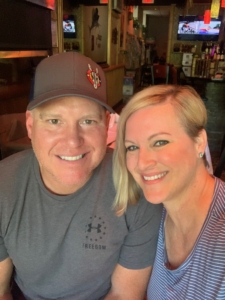Warrior Spotlight: Molly O’Connell’s Journey of Healing and Hope
 Three years ago, as she was being rushed into emergency surgery at Walter Reed National Military Medical Center during the COVID pandemic, doctors told U.S. Air Force Major (ret.) Molly O’Connell and her husband that there was a chance she may not walk again — it would depend on the severity of the damage to her spinal cord.
Three years ago, as she was being rushed into emergency surgery at Walter Reed National Military Medical Center during the COVID pandemic, doctors told U.S. Air Force Major (ret.) Molly O’Connell and her husband that there was a chance she may not walk again — it would depend on the severity of the damage to her spinal cord.
Molly recently shared her story with us after attending Warrior Canine Connection’s (WCC) Mission Based Trauma Recovery (MBTR) training program in partnership with Wounded Warrior Project (WWP). We are privileged to share her warrior story below.
Molly enlisted in the Air Force after high school and spent 20 years serving her country. During the first 10 years of her military career, she was enlisted in mortuary services. She then went on to get her nursing degree and became an officer, where she spent an additional 10 years caring for others.
Molly had always had spinal issues during her service and deployments. She had undergone previous surgeries, including a neck fusion and spine surgery. But in 2020, she was diagnosed with cauda equina syndrome, a diagnosis that means she had compressed nerves at the base of her spinal column causing severe pain and paralysis from the waist down. She underwent emergency surgery at Walter Reed.
“It took two years for me to start walking again,” said Molly, “I completed intensive physical therapy and came home in a motorized wheelchair. My husband pulled in the driveway and showed me the ramp that the VA installed for me at the front door of the house, and right then I swore I was going to walk again and remove that ramp, and I did.”
Walking again was a tremendous feat, but despite overcoming that huge physical hurdle, Molly says it took a toll on her mental health due to her “new normal,” and she became extremely depressed. This change meant she had to walk away from her nursing career and several other hobbies she had.
“Even though my body was getting better, mentally, I was not doing well at all,” says Molly. “You can do all the exercises in the world, but that doesn’t help when you are feeling alone and down.”
She started seeing a therapist at the Steven A. Cohen Clinic who told her about Warrior Canine Connection’s (WCC) Mission Based Trauma Recovery (MBTR) training program. Molly says the mere mention of dogs had her immediately interested.
She attended WCC’s eight-week Mission Based Trauma Recovery training program, helping to train service dogs in training for other Veterans. But during the process, she learned a lot about herself.
“MBTR has completely turned my life around … I want to live now, I want to do stuff, I want to become an ambassador for WCC,” said Molly. “I am obsessed with animals and being able to be social again really helped me mentally. I think there’s so much to be said for people who come back from deployment — they might have medical wounds that are going to heal, but being able to return to life and be part of a community again is a huge part of it.”
Molly also credits her husband, Vince Holtmann, who served eight years in the Air Force, with much of her recovery. Her physical challenges meant they could no longer ride bikes and work out together, like they used to. Together, they attended Wounded Warrior Project’s program, Project Odyssey, a couple’s retreat of sorts, where they were able to spend quality time and reconnect.
“The one-week program [Project Odyssey] focused on ways to re-engage and communicate with each other while more importantly, to relearn one another after life-changing events. Both WCC and WWP have been awesome. They’ve helped give me a sense of purpose. Before entering the military, I often wondered why people leave the service and keep talking about years and years later. I never thought that would be me, but there is that sense of camaraderie you miss … it’s like a big family with so much in common to talk about that a lot of people in the outside world can’t relate to … I was still missing that and being around other Veterans and sharing common ground helped me feel like I wasn’t going through it alone.”
After completing WCC’s MBTR training, Molly signed up as a volunteer and is helping to train future service dogs.
Molly also shares her name with WCC’s Molly, an honor she accepted after her husband nominated her as a namesake for the yellow Labrador Retriever and current service dog in training.
To learn more about WWP’s programs, visit www.woundedwarriorproject.org. For more information about WCC’s MBTR program, visit www.warriorcanineconnection.org.



Leave a Reply
Want to join the discussion?Feel free to contribute!